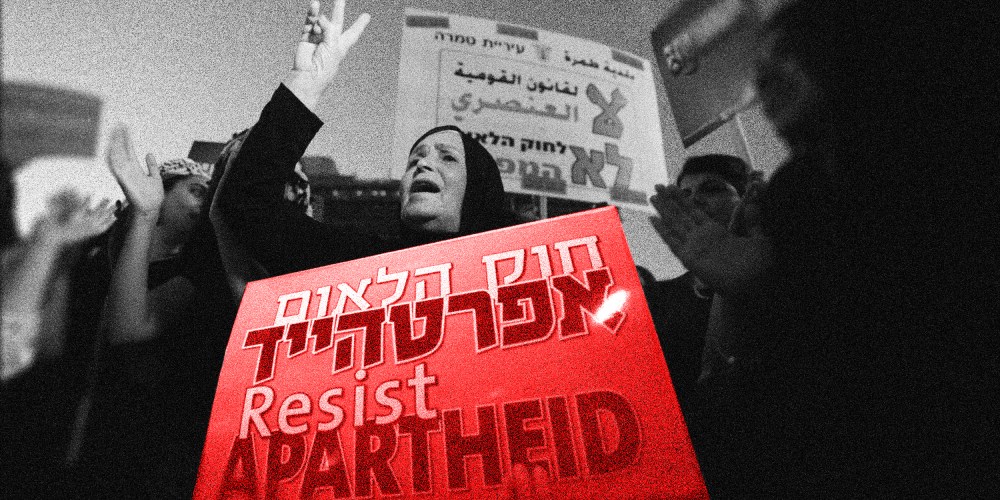A court in Israel clarified something Monday with its decision to cite the country’s controversial “nation state” law: Israel has enshrined racism as one of its basic principles.
The court all but said the city couldn’t risk attracting more Arab residents — a decision that it used the “nation state” law to justify.
The lawsuit asked the northern Israeli city of Carmiel to reimburse Arab parents for the costs of driving their kids to school each day, because Arabic-language schooling isn’t available inside the city limits. In its dismissal of the case, the court all but said the city couldn’t risk attracting more Arab residents — a decision that it used the “nation state” law to justify.
I normally hate writing about the Israeli-Palestinian conflict— mostly because it’s a subject that produces a black hole of misunderstandings and prompts people to ignore nuance, especially online. There’s a lot that makes that the case — but setting aside the anti-Semitism against Israelis, the violence carried out over the last 70 years, the blockade of Gaza and the resulting humanitarian crisis, and everything else that makes this issue so contentious, we should be able to agree on one thing: The court’s decision is racist.

It proves that critics of the “nation state” law were right to call the law racist when it was narrowly passed in 2018. The act is one of what are known as Israel’s “basic laws,” measures that serve as de facto articles in the state’s unfinished constitution. These laws form the underpinning of the government — most involve the structure of the organs of the state. (The 1992 Basic Law on Human Dignity and Liberty is special in that its text mandates that its provisions supersede any other law that might violate it.)
Under the terms of the “nation state” law, “the right to exercise national self-determination” in Israel is “unique to the Jewish people” — meaning only Jews can decide the makeup of the state and society, blocking out the nearly 2 million Arabs who call Israel their home. It also declares that the “state views Jewish settlement as a national value and will labor to encourage and promote its establishment and development.”
The majority of the city’s 500 Arab school-age children are forced to attend school outside the city limits so they can learn in Arabic.
For Israelis who want their country to be a multiethnic democracy, a law that specifically bans minorities from taking part in choices that affect the country — while is also expands into Palestinian territories — is problematic, to say the least. The basic law also downgraded Arabic from an official language, which it had been since the country’s founding, to a “special status” language, furthering the sense that the law cements Arab Israelis as second-class citizens.

Those concerns are now playing out in Carmiel, a town in Galilee that is 94 percent Jewish and 6 percent Arab. It’s a problem that has lurked for years in Israel as Arab families move into Jewish-majority areas, trying to find affordable housing — circumventing the restraints on growth placed on Palestinian cities — and to improve their lives. Once there, they’ve found a lack of services to accommodate them and their children, if not outright discrimination.
Substitute the words “white” for “Jewish” and “Black” for “Arab.” This is the same sort of logic that divided America’s cities with redlining, keeping white suburbs free of Black residents and preventing Black upward mobility.
In Carmiel, the majority of the city’s 500 Arab school-age children are forced to attend school outside the city limits so they can learn in Arabic. Carmiel’s government is scattershot about its policies here — it doesn’t reimburse many of the parents for this hardship, unless forced to in court, and it no longer funds any busing of the students to Arabic-language schools. Dozens of parents petitioned the government in March to apply its reimbursement policy more evenly or provide the needed transportation, but to no avail.
A lawsuit filed in November sought to force the city to reimburse the family of two children, ages 6 and 10, about US$7,500 for their travel. The Krayot Magistrates Court dismissed the suit Monday and ordered the plaintiffs to pay legal fees to the defendants, the Israeli newspaper Haaretz reported. The chief registrar, Yaniv Luzon, reportedly wrote in the court’s decision that one reason the suit couldn’t go forward was that “Carmiel, a Jewish city, was meant to establish Jewish settlement in the Galilee.” It only follows then, he wrote, that establishing an Arabic-language school and paying for rides for Arab students “could change the demographic balance and damage the city’s character.”

While he gave seven reasons for dismissing the case, Luzon’s ruling specifically cited the basic law’s settlement provision to argue that a city’s demographic makeup is “an appropriate, dominant” factor when local governments set rules and regulations.
Imagine a court saying that in the United States. Substitute the words “white” for “Jewish” and “Black” for “Arab.” This is the same sort of logic that divided America’s cities with redlining, keeping white suburbs free of Black residents and preventing Black upward mobility. It’s not a direct comparison, historically speaking — but in terms of the power dynamic, it’s a valid one.












